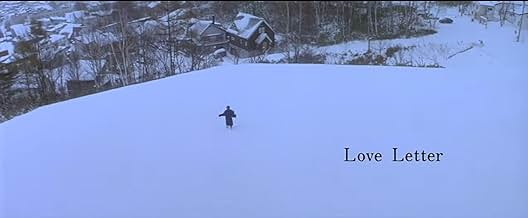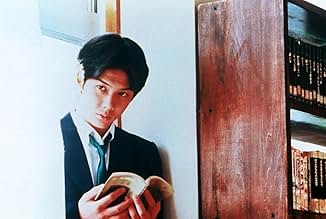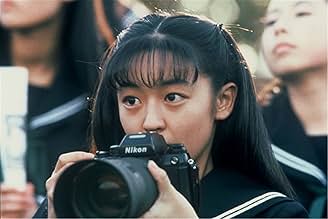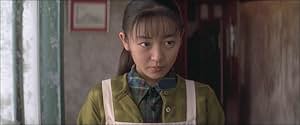After losing her fiance in a fatal mountain-climbing incident, Hiroko was devastated. She comes across his childhood address in a school yearbook and impulsively writes to him. But what happ... Read allAfter losing her fiance in a fatal mountain-climbing incident, Hiroko was devastated. She comes across his childhood address in a school yearbook and impulsively writes to him. But what happens when she receives a reply?After losing her fiance in a fatal mountain-climbing incident, Hiroko was devastated. She comes across his childhood address in a school yearbook and impulsively writes to him. But what happens when she receives a reply?
- Awards
- 14 wins & 3 nominations total
- Director
- Writer
- All cast & crew
- Production, box office & more at IMDbPro
Featured reviews
The film starts out very slowly, leisurely in a snail pace but give it time. By the end of teh first act, you'll be hooked till the subtle twist-in-the-end (more on that later).
The film reminds me alot of The Double Life Of Veronique as it uses the same concept of having the two protagonists being played by the same actress. I've watched both and though Veronique is a masterpiece, this film is a few notches above.
Now the ending of the film is at once touching, intriguing, disturbing and very hard to accept. Some people might have seen it coming early into the film but it caught me off guard. It is not like "Teh Sixth Sense" or "The Usual Suspects" kind of twist ending but it runs along the lines of....man, i can't think of any other film which has this kind of ending. I won't spoil it for you but it involves the two leads and the one "thing" they have in common. Ohh....its tempting to reveal the secret but i won't.
Check this film out. Everything is top notch - direction, script, cinematography, acting, editing and the musical score. Definitely the number one Japanese movie in my favourite film list. I love it...you'll love it too.
While looking through her fiancé's old school yearbook after the memorial ceremony, Hiroko wants to find something of Itsuki that she can hold onto, some token that will allow her to let go. Finding his name in the yearbook, she jots down the address associated with the name Itsuki Fujii and mails a short letter addressed to him in Otaro in northern Japan. She asks "How are you? and tells him, "I am fine". Thinking that she is sending a letter to heaven, she is supported by Akiba (Etsushi Toyokawa), a close friend of Itsuki who has fallen in love with her and strongly wants her to complete the past. To her surprise she receives a reply and, after the exchange of several letters, discovers that her correspondent is not a disembodied spirit but a very alive woman with the same exact name as her fiancé. Even more astonishing is that both male and female Itsuki Fujiis were classmates together in Junior High School.
While there is some initial confusion stemming from the fat that both Hiroko and the female Itsuki are performed by the superb Miho Nakayama in a dual role, each character's personality is so individual that any confusion is soon dispelled. As the letters continue, Itsuki uncovers some hidden truths about herself, her father's death, and her relationship with the shy student with the same name. Bringing to light memories from the past that she had long buried, she remembers how they were teased by fellow classmates for having the same name, how they developed a bond while working together in the library, and how the male Itsuki, checking out books from the library, wrote his name on five checkout cards saying to her in English "straight flush".
Sensing that Hiroko's quest for completion has reached a dead end, Akiba takes her on a trip to Otaru to meet the female Itsuki and to search for some memento of her fiancé. In a memorable scene in which, in the words of author Marion Woodman, "the eternal crosses the transitory", Hiroko cries out to the mountain that holds the body of her lost love, "O-genki desu ka? "Watashi wa genki desu", "How are you? I am fine", and the words echo through the winter night to be repeated by the female Itsuki sitting in her home miles away.
Love Letter is a film of exquisite cinematic poetry that explores the subjectivity of memory and the idea of redemption. Author Robertson Davies says, "One always learns one's mystery at the price of one's innocence" Like gemstones of coral and quartz that fill our life with joy, Itsuki Fujii came into the lives of two young women, then as suddenly as he appeared, he was gone, yet now both Hiroko and the female Itsuki have established a strange connection and are, in the words of Elizabeth Lesser, "no longer dead, but alive with something luminous and solid burning in their core".
Here is another.
There are many factors of the story, and the director(also the writer), Shuji Iwai, tells them beautifully and seamlessly.
Each story could stand on it's own, but in fact it is each story that moves the film.
Though it originally is about Watanabe Hiroko, the character Fujii Itsuki(female) takes over the story to the end.
This is a movie that makes you think about it long after it's over. That's why I bought it. So, I can watch it when ever I want. There are no life lessons to be learned(except maybe listen to the "crazy" grandpa) nor a message to take away from this. Yet, the film grips you until it's finished. Wrapped up in these women's lives and memories, and scenic cinematography that Japanese films are well known for.
In conclusion. I'm still thinking about it.
The first 30+ minutes of "Love Letter" were quite boring, but if you ever watched the movie again, knowing how the plot unfolds, they'd be anything but boring. The premise of this is cool and a little creepy: a woman, enstranged by her husband's untimely death, sends a letter to his old address. She knows that the house was knocked down and built over by a highway years ago, but does it anyway, perhaps out of desperation. Unexpectedly, she gets a reply. From there, the story begins, and it takes a much different direction than how the plot sounds on paper. I can't really say too much without spoiling it, but this is a tragic movie, yet beautiful at the same time. There are flashback sequences that make you really care about several characters in the movie, including the deceased man (who is shown as a school boy in the flashbacks). This is so well set out, and almost brought me to tears at times. Movies like this are what make me want to see more and more Asian cinema, because this was an absolute epic.
The film is very striking visually, in turns showing sweeping landscapes and intimately detailed portraits. Emotions are at times powerfully conveyed by a camera movement accompanied by a well chosen musical score. The limited use of a hand-held camera jarred with the serene beauty of the rest of the film, which no doubt was the intent, but I found it to be a minor distraction.
All in all, a very poetic missive delivered to us by the skilled hand of Shunji Iwai.
Did you know
- TriviaWas the highest-grossing Japanese film in South Korea, except Japanese animation.
- Quotes
Male itsuki fujii: [Checking out books from the female Itsuki in the school libray. The male Itsuki holds up five checkout cards that he has been the first to sign like a poker hand. He speaks in English] Fujii Itsuki straight flush.
- ConnectionsReferenced in It's Entertainment (2014)
- How long is Love Letter?Powered by Alexa
Details
Box office
- Gross US & Canada
- $4,900
- Gross worldwide
- $7,859,654
- Runtime1 hour 57 minutes
- Color
- Sound mix
- Aspect ratio
- 2.35 : 1
Contribute to this page

























